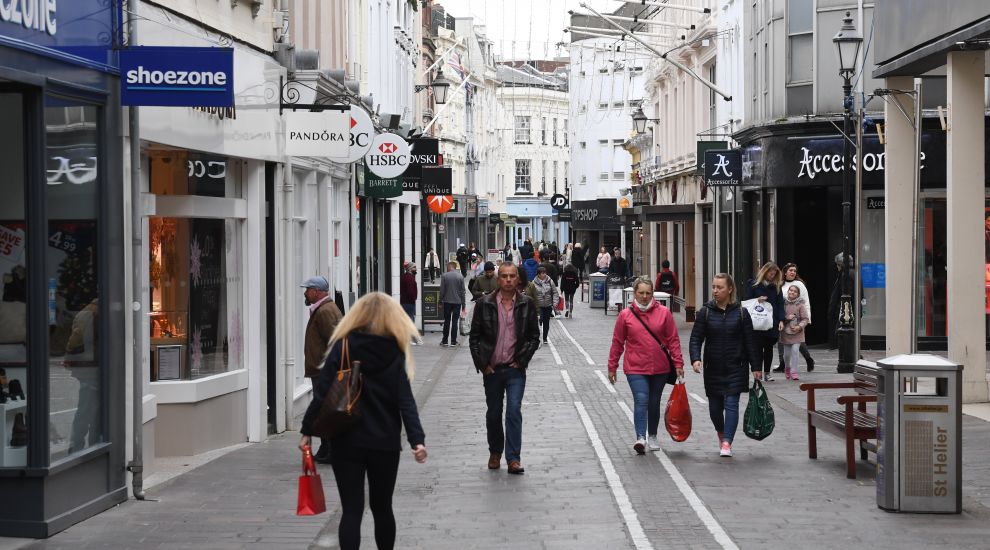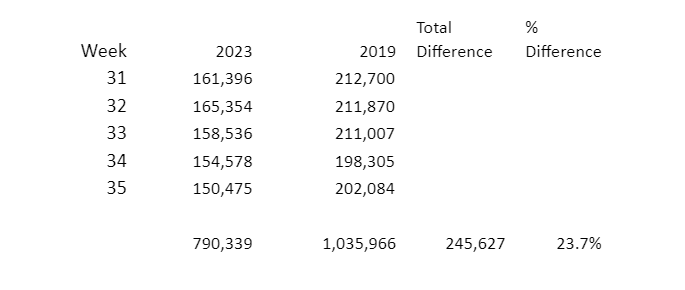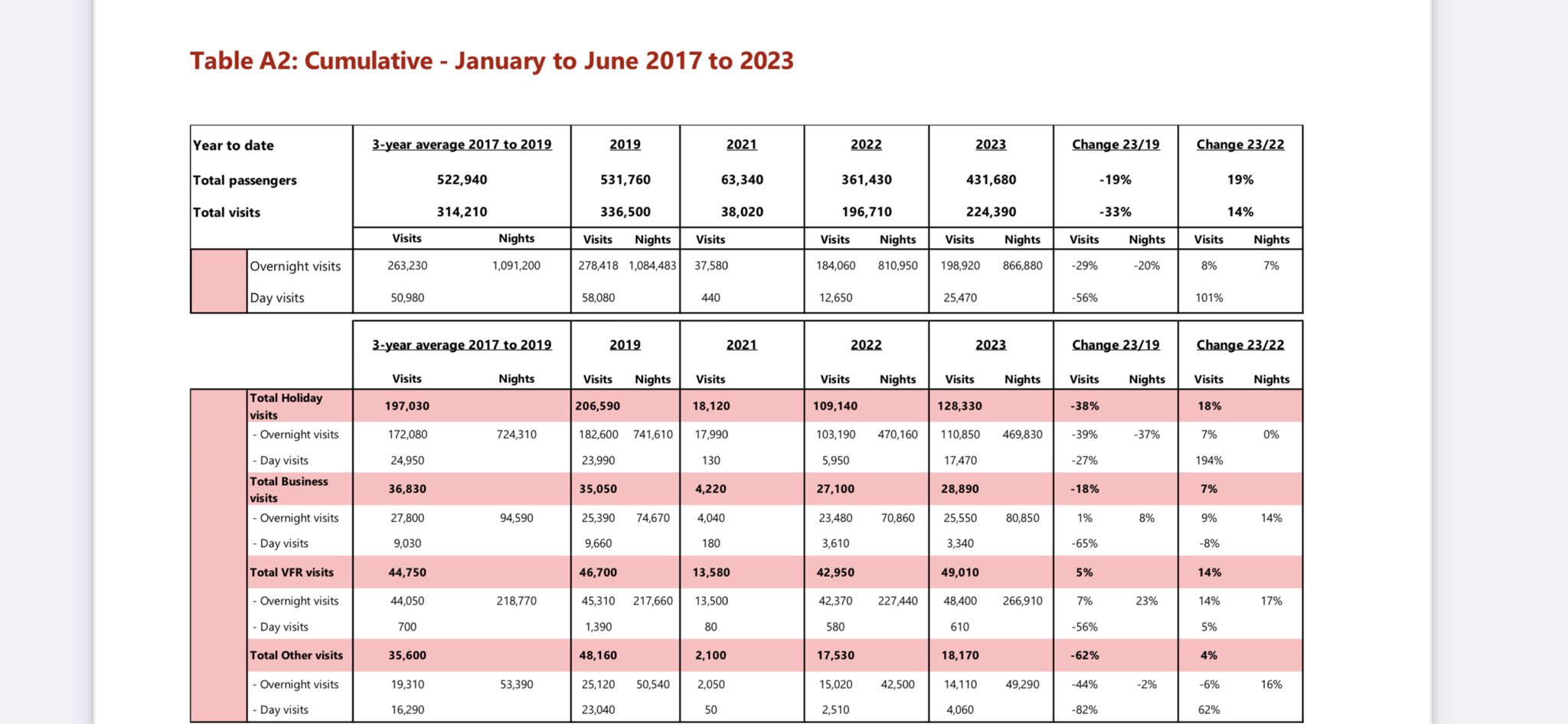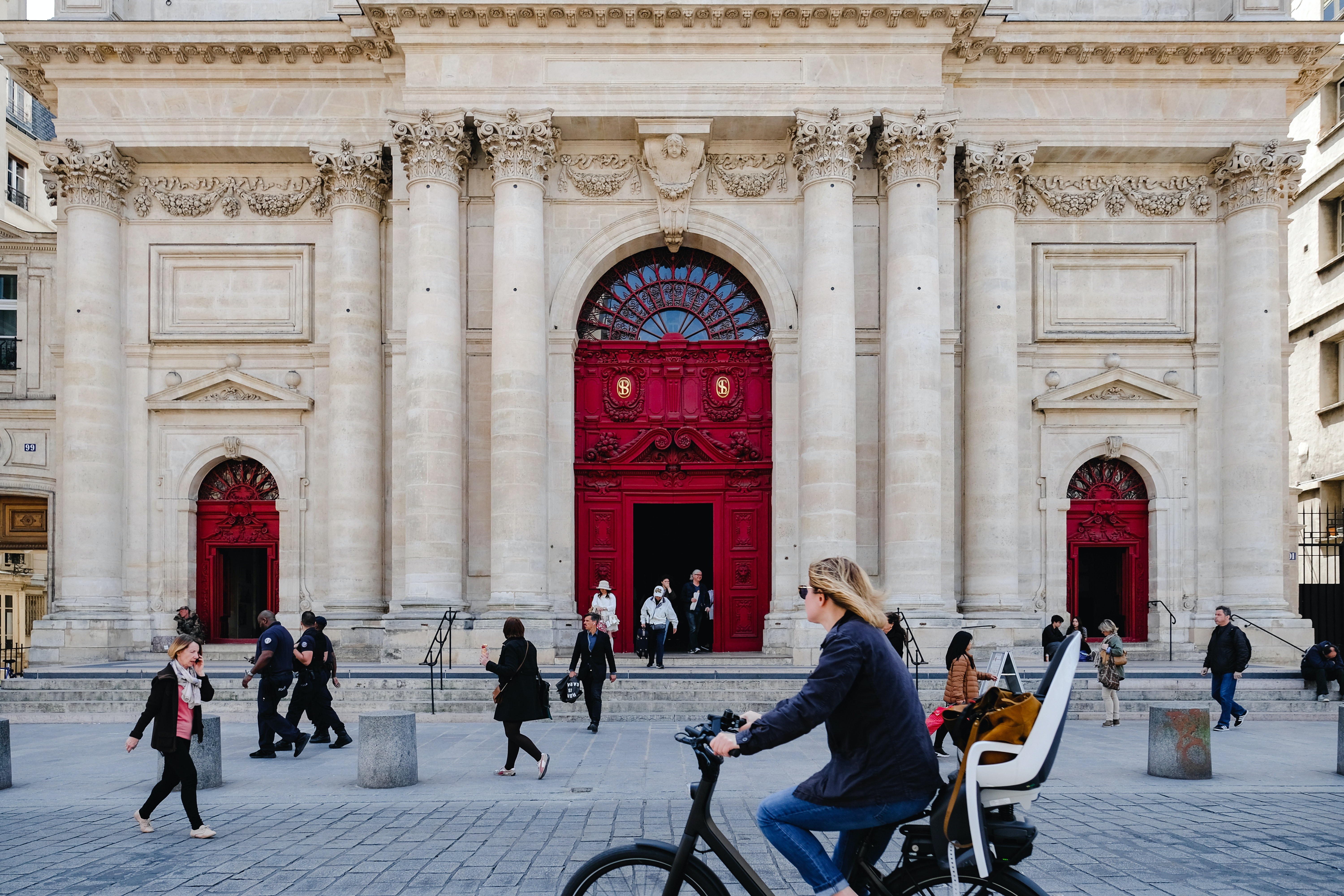


Recent statistics indicate that levels of foot traffic in St. Helier are struggling to recover from the impact of the pandemic – with initiatives to reshape town's public spaces, revitalise the Central Market, and boost tourism all part of efforts to regenerate Jersey's town centre.
The recent data, released by Springboard, a company specialising in tracking consumer behaviour, shows a 24% drop in foot traffic during August compared to the same period in 2019 (before the impact of the pandemic).
Foot traffic reflects the number of people walking in commercial and public areas.
It can provide insights into economic health, community engagement, and urban planning needs to help shape the overall character and functionality of a town.
The stark decline in St. Helier's footfall has not gone unnoticed by local business owners including Dominic Jones, a restaurateur who is concerned about its adverse effects particularly within the hospitality sector.
Footfall in St Helier down 24% in August (July 31 to Sept' 3) compared to same period 2019.
— Dominic Jones (@DominicCJones) September 5, 2023
To put into context that is 245,627 fewer people working, shopping and dining in town in our peak summer month - not sure we can blame the weather as people weren't on the beach.
Mr. Jones explained that in August 2023, there were approximately 250,000 fewer individuals seen on King Street when compared to August 2019.

Pictured: The St Helier footfall for 31 July to 3 September 2023.
He feels that the reduced foot traffic will “inevitably” translate into a decline in sales for local businesses including retail stores, cafes, and restaurants.
This decline in footfall can be attributed to shifting consumer behaviours following the onset of the pandemic, according to Mr. Jones.
Factors such as the widespread adoption of remote work, a surge in online shopping, and a shift toward home-centric lifestyles have all played a role in reshaping the way people engage with Jersey's town centre.
The findings of the Jersey Retail 2023 Report support this, highlighting a significant increase in online shopping.

Pictured: The January to June visitor statistics from 4insight's Passenger Exit Survey.
Mr. Jones also highlighted how the current cost-of-living crisis coupled with various construction projects has made travel into the town centre more challenging.
Furthermore, the local business owner pointed to how the number of leisure and business visitors to Jersey has seen a substantial decrease, with a 38% and 18% decline respectively since 2019, as indicated by 4insight's Passenger Exit Survey.
St. Helier Town Centre Manager Connor Burgher confirmed that the number of people visiting St. Helier had diminished due to the impact of remote work and fewer visitors to the island.
However he noted that, although footfall has not gone back to 2019 levels, it has improved year on year since the pandemic began.
Mr Burgher added that he anticipates continued growth in footfall, albeit not "overnight".
Mr. Jones maintains also a positive outlook for the future of St. Helier despite the challenges identified, suggesting that the town can make a recovery through collaborative efforts.
This sentiment is echoed by Sasha Gibb, a community advocate and the driving force behind the 'Public Voice: Common Ground' initiative.

Pictured: Sasha Gibb, founder of the 'Public Voice: Common Ground' project.
This project aims to enhance public space on the island and reshape St. Helier into a more inclusive and welcoming environment.
Mrs. Gibb observes that St. Helier has come to be synonymous with shopping for many, but the recent surge in online retail has redefined this perception.
What I would also add is why would you go to St. Helier? There is nothing to pull me in, to tempt me to do into town and I live in St. Helier. Minimal green space, too much traffic and no interesting/diverse shops. All a bit bland. Only my opinion though.
— Stephen Le Quesne (he/him) (@slequesne) September 5, 2023
A revealing conversation with a Year 10 student illustrated this shift; "I don't need to go into St. Helier; I have an M&S next to where I live," they told Mrs. Gibb.
Other local students agreed that St. Helier was primarily for shopping, highlighting how their visits to town were driven by their parents' shopping and retail needs.
This narrative reflects the prevailing idea that most people living outside of town visit St. Helier out of necessity rather than genuine interest.
Nevertheless, Mrs. Gibb envisions a town centre that invites people to linger, take their time, socialise, and truly enjoy the experience.
View this post on Instagram
Her vision involves creating an environment that is more centred around people, and "less transactional in nature".
She aims to achieve this by directly responding to the growing demand for green spaces and communal areas within the town.
With the collective commitment of various stakeholders and a shared vision of a vibrant, people-centred town, both Mr. Jones and Mrs. Gibbs believe there is potential to reverse the decline in foot traffic and usher in a new era of prosperity for the community, even in the face of lingering challenges and behaviour changes in the wake of the pandemic.
In response to the decline in footfall, the Government is taking steps to revitalise St. Helier, with the goal of turning it into a lively and event-oriented destination.
This initiative is, in part, a response to recent research on post-pandemic retail trends, including findings from the Retail Survey. This research highlighted a strong public desire to engage in meaningful experiences within St. Helier.
Pictured: Deputy Morel envisions St. Helier as a vibrant event hub, drawing in those in search of 'one-of-a-kind' experiences.
Leading these efforts is Deputy Kirsten Morel, the Minister for Economic Development, who is actively working alongside fellow Ministers within the Future Places Ministerial Group to ensure the coordinated development of Jersey's built environment.
As well as providing financial support for the 'Public Voice: Common Ground' project, the Government also has plans to introduce more permanent measures, including additional pedestrianised areas to make St. Helier more engaging and vibrant.

Pictured: Pedestrianised zones, known for fostering social interactions and event-oriented spaces, have the potential to increase foot traffic significantly.
Deputy Tom Binet, the Minister for Infrastructure, also responded to a review of St. Helier’s Markets by the Economy Department, which identified their "enormous potential".
Deputy Morel is actively considering the option of extending the markets' operational hours and reshaping them to serve as central town hubs capable of hosting various events.
Why would anybody choose to go into St Helier unless they had to? Even parking has gotten noticeable easier; we need up-to-date data on population, the census was a waste of time, &any policy based on bad data is going to be utter garbage.
— mpw (@mpw_) September 5, 2023
So much anecdotal evidence of an exodus
The Minister envisions that this initiative will mark the beginning of a "new era" for the Central Market, fostering a dynamic nighttime economy and injecting a livelier atmosphere into the heart of the town.
Some restaurants in the Central Market already trialled opening late on various Friday and Saturday nights throughout summer, which was described as the first major step forward in a plan to make the food hotspot the "jewel in the crown" of town once again.
The idea of the Central Market becoming a 'night market' – following in the footsteps of the Borough Market in London and the Mercado de San Miguel in Madrid – has been gaining popularity for some time.

Pictured: The owners of La Bouche, a restaurant in the Central Market, described being able to open late as a "historic moment".
Indeed, the idea had the support of former Government CEO Suzanne Wylie, who previously spoke of the success of “twilight markets” in Belfast, where she used to live and work.
It also had the support of Marcus and Ana Calvani, the Co-Chief Executive Officers of the Jersey Hospitality Association, who reportedly "loved the idea".
Additionally, the resurgence of tourism after the pandemic will play a pivotal role in Jersey's efforts to boost post-pandemic foot traffic.
Pictured: Deputy Morel is exploring the possibility of extending operating hours and reshaping the markets to become central town hubs equipped for hosting events.
The Economic Development Minister underscored the positive outcomes of implementing ID cards for French visitors in March.
This initiative permits French national day trip visitors to enter Jersey using their national ID cards, alleviating the need for passports as mandated post-Brexit.
The reintroduction of passport requirements – following the UK’s withdrawal from the EU – had caused the number of visitors from France to Jersey drop significantly, as only about 50% of the country’s population has a passport.
Therefore the ID card initiative contributed to the revitalisation of the French 'day trip' market, drawing more tourists to Jersey.
Comments
Comments on this story express the views of the commentator only, not Bailiwick Publishing. We are unable to guarantee the accuracy of any of those comments.